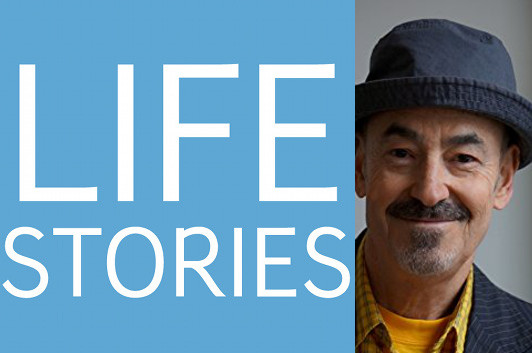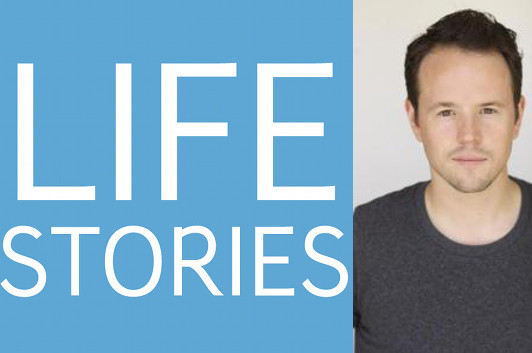Life Stories #87: Barry Yourgrau
Barry Yourgrau actually lives just around the corner from me in Queens, so it was absurdly easy for us to get together to chat about his memoir, Mess—and the fact that this episode was recorded in my kitchen explains the occasional traffic noises from outside the second-floor window. Anyway, we had a great time talking about why he didn’t let anyone into his working studio—not even his girlfriend, whose apartment it was originally—and what happened when she finally told him to get it together. That led us to the differences between clutter and hoarding, and about how his efforts to create a document of his efforts to finally clear out his apartment sometimes created a “double block,” where he wasn’t writing and wasn’t cleaning. And then I mentioned how Mess foregrounds one of the fundamental qualities of memoir, the way in which it offers the memoirist’s life up for judgment, because that’s something Yourgrau does himself with practically everyone he encounters in the course of his story. Here’s what he said about that:
“To a certain extent, memoir is… people have doors which they—this is my room, don’t go in, a room of one’s own, right? So in a certain sense, a memoir opens that door. So for an artist to go into there is really difficult, a process of tremendous opening up vulnerability. But, on the other hand, the act of writing is a way of controlling.
Nobody’s memoir is the forensic truth… I mean, how many memoirs have you read where people remember conversations in their childhood? You tell me one person who remembers what they said in the kitchen to their mother. I mean, they may generally remember, but if they start offering you dialogue, it’s all constructed. Sometimes constructed with more veracity, sometimes constructed with less veracity…
For me, one of the things that’s interesting is that I’m usually a fiction writer, of, if I may say so, surreal fiction, but it’s surreal fiction like dreams, which means that it’s actually rather revelatory and confessional… I’m known kind of as a fantasist or something, but actually everything is—they’re all based on emotional events in my life that I dress up and change.”
Two collections of his early stories, Haunted Traveller (which is subtitled “An Imaginary Memoir”) and Wearing Dad’s Head, have just been reissued in paperback as well.
Listen to Life Stories #87: Barry Yourgrau (MP3 file); or download this file by right-clicking (Mac users, option-click). Or subscribe to Life Stories in iTunes, where you can catch up with earlier episodes and be alerted whenever a new one is released. (And if you are an iTunes subscriber, please consider rating and reviewing the podcast!)
photo: Charles Raben / Urban Face
5 October 2016 | life stories |
Life Stories #86: Matteson Perry
After Matteson Perry broke up with his “Manic Pixie Dream Girl,” he realized that he’d never really not been in a serious relationship since high school, and decided it was time to get casual. Available recounts his adventures, and over the course of our conversation he explained what he learned about himself during his year of no-strings-attached dating, including how the validation he got from being able to land so many first dates was like the thrill he got as a stand-up performer—as well as how he ended up meeting his wife (and not dating her for several months), and what she thought when he told her he was going to write a book about how he was playing the field just before they started seeing each other. We also talked about how this very clearly isn’t a book about how to pick up women and how, as he tells his stories, he’s generally careful to make himself the butt of any jokes, treating the women on the other side of the anecdotes with empathy:
“Through storytelling, I know what works with a crowd for me, and angry and mean does not work for me. There’s some comics, they can work angry and mean, it’s hilarious; I’m not one of those comics. I need to be self-effacing and empathetic and thoughtful about things and then find humor there.
So I tried to take that point of view, and the other thing that helped is my agent is a woman, and so she would let me know when I was being a douchebag in the book, and we would rework it. Not that you would change a story, but think about it from the other person’s point of view—you know, okay, I can see how that would be taken the wrong way by a woman—this specific woman, or any woman—and let’s think about how this felt to her as well.”
Listen to Life Stories #86: Matteson Perry (MP3 file); or download this file by right-clicking (Mac users, option-click). Or subscribe to Life Stories in iTunes, where you can catch up with earlier episodes and be alerted whenever a new one is released. (And if you are an iTunes subscriber, please consider rating and reviewing the podcast!)
photo: Stephanie Nelson
27 September 2016 | life stories |



 Our Endless and Proper Work is my new book with Belt Publishing about starting (and sticking to) a productive writing practice.
Our Endless and Proper Work is my new book with Belt Publishing about starting (and sticking to) a productive writing practice. 
